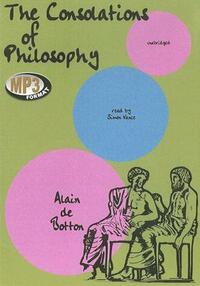You need to sign in or sign up before continuing.
Take a photo of a barcode or cover
informative
inspiring
reflective
fast-paced
As Consolações da filosofia é um livro muito rápido, o livro em si tem uma quantidade de páginas bem considerável mas cada capítulo apresenta uma “consolação”, ou seja, uma ideia teórica filosófica diferente.
Nesse livro é abordado Sócrates com sua teoria de questionamento geral, ele convence o leitor de que mesmo em situações que nossas verdades são contestadas devemos debater afim de compreender se aquilo acreditado realmente é o mais lógico e não apenas um equívoco geral disfarçado de “senso comum”, assim levando o leitor a valorizar seu conhecimento e suas propias ideias
Epicúreo é o próximo desvendando as causas de uma vida infeliz que em sua visão se dá por uma busca de satisfação carnal como objetos, poder e dinheiro assim contrastando com oque para ele seria uma vida de significado, em suas palavras o propósito está em encher a vida de bens naturais como sua mente, a natureza, e etc, parece extremamente banal em minhas palavras mas quando se lê realmente você percebe o significado disso
Vou terminar aqui,
Mas o escritor deixa o livro muito bem polido e simples levando a uma leitura rápida e dinâmica, cada página se conecta com a próxima e assim que vive começa você sente vontade de terminar
Nesse livro é abordado Sócrates com sua teoria de questionamento geral, ele convence o leitor de que mesmo em situações que nossas verdades são contestadas devemos debater afim de compreender se aquilo acreditado realmente é o mais lógico e não apenas um equívoco geral disfarçado de “senso comum”, assim levando o leitor a valorizar seu conhecimento e suas propias ideias
Epicúreo é o próximo desvendando as causas de uma vida infeliz que em sua visão se dá por uma busca de satisfação carnal como objetos, poder e dinheiro assim contrastando com oque para ele seria uma vida de significado, em suas palavras o propósito está em encher a vida de bens naturais como sua mente, a natureza, e etc, parece extremamente banal em minhas palavras mas quando se lê realmente você percebe o significado disso
Vou terminar aqui,
Mas o escritor deixa o livro muito bem polido e simples levando a uma leitura rápida e dinâmica, cada página se conecta com a próxima e assim que vive começa você sente vontade de terminar
informative
reflective
slow-paced
informative
reflective
slow-paced
A great intro to philosophy. I found it more engaging than other philosophy books because instead of talking about abstract theories it applies these theories to everyday struggles to give us a means if dealing with them. Taking away half a star because I don't agree with everything the author puts forth. The logic put forth on the section on love seemed tired and reductive while the anger and frustration sections just seemed to say if you're constantly aware that something bad can happen then you won't be so frustrated (that just sounds like anxiety to me). But the great thing about it is even in disagreeing with it you are learning from it. Also the authors tone is genial and engaging (unlike some other famous self-important nonfiction authors *cough* Richard Dawkins *cough*) so you aren't put off even if you disagree with some parts. The section on Epicurus was my most favourite and I will have to revisit it again from time to time.
easy to read overview of major thoughts from major philosophers. actually absorbing.
challenging
emotional
funny
hopeful
informative
inspiring
reflective
relaxing
medium-paced
It really delivers what the title avokes in you. In case you have doubts about getting involved in philosophy, this relatively short book will replace those doubts by giving examples from the lives of 6 prominent philosophers; Epicurus, Seneca, Nietzsche, Montaigne, Schopenhauer and Socrates in many useful aspects. If you are thinking about what philosophy can do for you, this is the address with the shortest possible answers, delivered in a witty manner.
informative
reflective
medium-paced
[bc:عزاءات الفلسفة: كيف تساعدنا الفلسفة في الحياة|27872336|عزاءات الفلسفة كيف تساعدنا الفلسفة في الحياة|Alain de Botton|https://i.gr-assets.com/images/S/compressed.photo.goodreads.com/books/1448130674l/27872336._SX50_.jpg|14280291]
نظراً لشهرة الكتاب والكاتب بنيتُ توقعاتٍ أكبر حيال المضمون، الكتاب جميل عموماً ومفيد لكنّه يغدو فقير المحتوى إن قارناه مثلاً بعمل سويسري آخر يُعنى بتقديم مدخل عن بعض الفلاسفة وهو"الدهشة الفلسفيّة" لجان هِرش الصادر بالنسخة العربية عن منشورات الجمل.
نظراً لشهرة الكتاب والكاتب بنيتُ توقعاتٍ أكبر حيال المضمون، الكتاب جميل عموماً ومفيد لكنّه يغدو فقير المحتوى إن قارناه مثلاً بعمل سويسري آخر يُعنى بتقديم مدخل عن بعض الفلاسفة وهو"الدهشة الفلسفيّة" لجان هِرش الصادر بالنسخة العربية عن منشورات الجمل.
challenging
informative
reflective
medium-paced
Really liked the ideas presented by the 6 different philosophers. The author analogised Epicurus and Socrates’ ideas very well and (I’d say) fairly accurate represented the historicity behind these ideas to the extent in which it’s needed.
Despite my initial understanding of their philosophies, I learnt a lot about how things like happiness are derived through friendship, freedom and thought. Through reevaluations, it was great to see how these are applicable to my own life especially when dealing with grief, loss, non achievement etc.
Although this book aims to provide a more "self help" perspective of philosophy, I’d say it’s a really good read for those who are just getting into philosophy and aim to do so academically. I’m quite a fan of how Alan, as a contemporary philosopher, presents the ideas of preceding philosophers in a more palatable way without taking away from its original meaning. However, I do also think that the simplification of ideas, can cause some details to be lost, but nonetheless I think Alan did a pretty good job in his presentation.
I’ll probably read this again right before I start studying philosophy academically as well since it’s analogies help with understanding concepts.
Despite my initial understanding of their philosophies, I learnt a lot about how things like happiness are derived through friendship, freedom and thought. Through reevaluations, it was great to see how these are applicable to my own life especially when dealing with grief, loss, non achievement etc.
Although this book aims to provide a more "self help" perspective of philosophy, I’d say it’s a really good read for those who are just getting into philosophy and aim to do so academically. I’m quite a fan of how Alan, as a contemporary philosopher, presents the ideas of preceding philosophers in a more palatable way without taking away from its original meaning. However, I do also think that the simplification of ideas, can cause some details to be lost, but nonetheless I think Alan did a pretty good job in his presentation.
I’ll probably read this again right before I start studying philosophy academically as well since it’s analogies help with understanding concepts.






